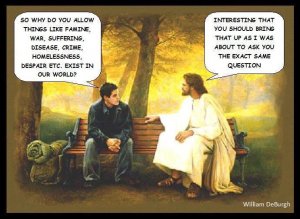Compassion between human beings. Shared suffering between humans beings. Tears shed together as human beings. Yes.
Compassion, shared suffering and tears predate science by millennia. Literature, songs and poetry teach us a lot more about these things than science ever could.
What does religion add to that except a lot of questions about why has God done this to me?
What does science take away, except to say that we are all in this together and share your grief at the same sad reality?
Different religions add different things. Buddhism offers a philosophy of acceptance and of denial of self.
Buddhism is a religion pretty centrally concerned with suffering. It never really stops studying the suffering of oneself and that of other people. These form a central focus of the religion, its practice and its philosophy. One is encouraged to explore what suffering is, the various forms it comes in and their root causes. To deal with suffering practitioners attempt to follow the Four Noble Truths. The nature of suffering is determined by how one reacts to it.
Islam sees suffering as a test.
In the latter view, suffering tests belief; a true Muslim will remain faithful through the trials of life. But suffering also reveals the hidden self to God. Suffering is built into the fabric of existence so that God may see who is truly righteous. In other words, God not only allows the various agonies and struggles of life, but has a purpose for them. Suffering opens up the soul and reveals it to God. God uses suffering to look within humans and test their characters, and correct the unbelievers.
For modern Jews, the tragic events of the Holocaust represent the most troubling examples of evil and suffering in all of human history. There have been many different responses to this most traumatic example of human suffering. One example is
Theologian Abraham Joshua Heschel (1907-1972), for example, argued that the Holocaust should move people to examine their own behavior, and not that of God: “The question about Auschwitz is not where was God, but where was man?” In a world where men and women are given free will (as the Hebrew Bible insists), we are accountable for our own moral failings. The time has come, Heschel insists, to heed God’s call and work as His partner in completing the work of creation.
Christians identify with a God who has already suffered. Jesus is the "suffering servant" of mankind.
Suffering is not an optional extra for Christians. It "comes with the turf". Christians are told to expect suffering as a condition of their faith and to help others to bear their suffering. Kindness offered to strangers in the form of food, drink, shelter, clothing and visitation is seen as kindness offered to Jesus himself.
Matthew 25:35-40New International Version (NIV)
[SUP]35 [/SUP]For I was hungry and you gave me something to eat, I was thirsty and you gave me something to drink, I was a stranger and you invited me in, [SUP]36 [/SUP]I needed clothes and you clothed me, I was sick and you looked after me, I was in prison and you came to visit me.’
[SUP]37 [/SUP]“Then the righteous will answer him, ‘Lord, when did we see you hungry and feed you, or thirsty and give you something to drink? [SUP]38 [/SUP]When did we see you a stranger and invite you in, or needing clothes and clothe you? [SUP]39 [/SUP]When did we see you sick or in prison and go to visit you?’
[SUP]40 [/SUP]“The King will reply, ‘Truly I tell you, whatever you did for one of the least of these brothers and sisters of mine, you did for me.’
Science studies physical pain and ways to eliminate or minimise it and modern psychiatry studies emotional pain and has developed treatments but it isn't the scientists or the psychiatrists who knock on the door with chicken soup, or boxes of groceries and toys. Nor does science speak very much about compassion.
Compassion existed before both science and religion came into existence. Religions give it different levels of importance. In that sense they can all be said to add something to this issue. So can philosophy, one of the oldest of the humanities.
Science is not concerned with it at all. It neither adds nor subtracts anything, but scientists are human and all humans, of all faiths and none, are capable of compassion.

